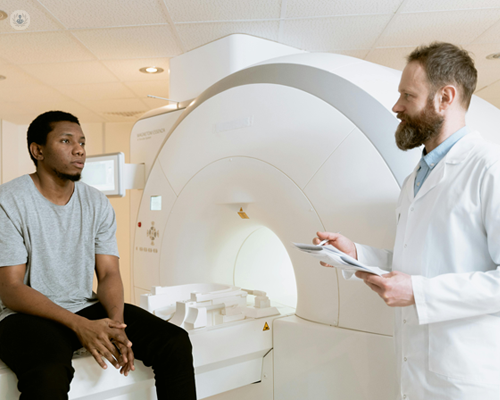Coronary CT scan: Risks and benefits
Autore:Here to discuss the risks and benefits of the coronary CT imaging test, is leading consultant cardiologist Dr Thomas Heseltine.

What is a coronary CT?
A coronary CT (computed tomography) is a non-invasive imaging test used to obtain detailed images of the heart and its blood vessels. It helps to diagnose various heart conditions, such as coronary artery disease, blockages, or structural abnormalities. The test involves the use of X-rays and a computer to create cross-sectional images, which can be used by cardiologists to assess heart function and anatomy.
What are the benefits of a coronary CT?
Coronary CT offers several advantages in diagnosing heart conditions, making it a valuable tool in cardiac care:
- Non-invasive: Unlike procedures such as coronary angiography, coronary CT does not require any invasive incisions or catheter insertions.
- Detailed imaging: The high-resolution images produced by coronary CT provide precise details of the heart’s structures, including the coronary arteries.
- Early detection: The test can help detect early signs of coronary artery disease or other heart conditions, allowing for timely intervention.
- Fast and efficient: Coronary CT scans are relatively quick, often taking just 10 to 20 minutes, with results available shortly after.
- Risk assessment: It can be used to assess the risk of heart attacks by identifying calcium deposits (calcifications) in the coronary arteries, providing valuable information for future preventive care.
What are the risks of a coronary CT?
Although coronary CT is generally considered safe, like any medical procedure, it does carry certain risks:
- Radiation exposure: The test uses ionising radiation, which can increase the risk of cancer over time. However, modern coronary CT machines use low-dose radiation to minimise this risk.
- Contrast dye reactions: Some coronary CT scans involve the use of contrast dye to enhance image clarity. In rare cases, patients may have allergic reactions to the dye or experience kidney problems, particularly if they have pre-existing kidney issues.
- Inconclusive results: In some cases, a coronary CT may provide inconclusive results, requiring further testing or more invasive procedures.
Is coronary CT right for everyone?
Not everyone is an ideal candidate for a coronary CT. It may not be recommended for individuals who:
- Are pregnant, due to radiation exposure
- Have severe kidney problems, as the contrast dye may cause complications
- Have a history of allergic reactions to contrast dyes
Consultation with a cardiologist is crucial to determine if a coronary CT is the most appropriate diagnostic tool for your heart health.
Do you require expert cardiology treatment, and think you might need a coronary CT? Arrange a consultation with Dr Heseltine via his Top Doctors profile.


